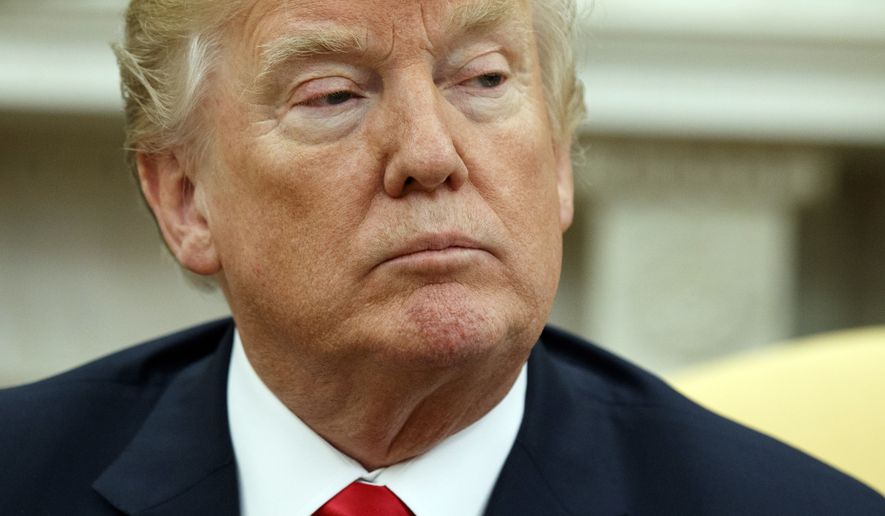A bipartisan group of senators pressed President Trump to formalize a strategy for deterring cyberattacks as required by the 2018 National Defense Authorization Act he signed into law last year.
“We write to urge you to prioritize completion and announcement of our nation’s cyber deterrence strategy as soon as possible,” 14 senators wrote the president in a letter sent Wednesday led by Sen. Martin Heinrich, New Mexico Democrat.
“The lack of decisive and clearly articulated consequences to cyberattacks against our country has served as an open invitation to foreign adversaries and malicious cyber actors to continue attacking the United States,” the senators warned, adding that a strong cyber doctrine was not only necessary, but “critical to our nation’s survival in the digital age.”
Signed into law in December, the 2018 defense spending bill contains a provision that withholds funding for the White House Communications Agency “contingent upon the submission of a report on a national policy for cyberspace, cybersecurity and cyberwarfare.”
Mr. Trump announced his opposition to that provision at the time of his signing, however, calling it an “unprecedented and dangerous funding restriction” that would “hold hostage the President’s ability to communicate in furtherance of the Nation’s security and foreign policy.”
Nearly three months after being signed, lawmakers from either side of the aisle warn that a formal policy for warding off and responding to cyberattacks is needed more than ever, particularly given concerns raised by ongoing alleged Russian election meddling.
“Our adversaries need to understand the boundaries of what is acceptable in the cyber domain, as well as the circumstances under which we would utilize offensive capabilities to retaliate against cyberattacks,” the lawmakers wrote.
“Critical infrastructure such as the electric grid, oil pipelines, air traffic control and financial institutions all use the internet and can be manipulated, disrupted and in some cases even destroyed,” they added. “Beyond physical damage, state sponsored disinformation and data manipulation campaigns have sowed lines of division and discord within our country and have targeted the very foundation of our democracy — the electoral process.”
The letter was co-signed by Republicans including Sen. Mike Rounds of South Dakota, the chairman of the Senate Armed Services subcommittee on cyber, as well Sens. Lindsey Graham of South Carolina, Dan Sullivan of Alaska, Tim Scott of South Carolina and Ben Sasse of Nebraska. Other signers include Sen. Angus King, Maine independent, and Democratic Sens. Jeanne Shaheen of New Hampshire, Richard Blumenthal of Connecticut, Kirsten Gillibrand of New York, Tim Kaine of Virginia, Gary Peters of Michigan, Elizabeth Warren of Massachusetts and Mazie Hirono of Hawaii.
“We urge you to provide us an immediate update on the status of the United States government’s cyber deterrence strategy including a timeline of its progress and an anticipated timeline for completion,” they wrote.
The White House did not immediately return an email seeking comment.
Lawmakers from either side of the aisle have taken aim at both the Obama and Trump administrations for years over the federal government’s lack of a cyber deterrence policy, including as recently as this week during a Senate Armed Services Committee hearing on worldwide threats.
“I don’t think the progress has been made quick enough to put us in a position where we have a firm policy and understanding of not only ourselves but what our adversaries know relative to how we’re going to deal with this,” Director of National Intelligence Dan Coats told Mr. Rounds during the hearing.
Testifying before the same panel days earlier, Mr. Trump’s pick for National Security Administration director, Army Lt. Gen. Paul Nakasone, said that foreign adversaries are willing to continue hacking U.S. targets on account of the Trump administration’s subdued reaction to past state-sponsored attacks.
“Right now, they do not think that much will happen. They don’t fear us. That is not good,” he said during his confirmation hearing last Thursday.
“The longer that we have inactivity, the longer that our adversaries are able to establish their own norms,” he added.
• Andrew Blake can be reached at ablake@washingtontimes.com.




Please read our comment policy before commenting.